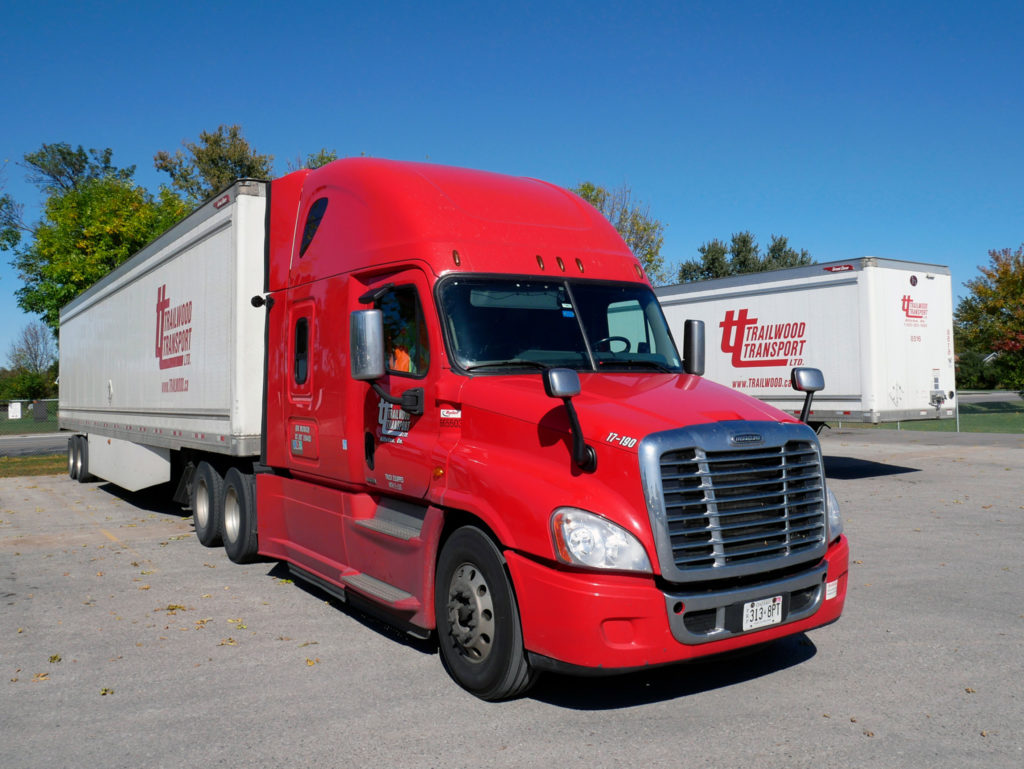Truck fleets report plunging loads, layoffs amid Covid-19

TORONTO, Ont. – Trucking is identified as an essential service, but Canada’s trucking industry is under immense economic pressure in the face of Covid-19 – leading to plunging revenues, layoffs, and cash flow issues in recent weeks.
It isn’t expected to get better anytime soon.
The challenges have been identified through separate surveys by the Canadian Trucking Alliance (CTA), which collected responses from 100 carrier members, and a monthly survey of Today’s Trucking readers, representing responses in the last week from 246 trucking industry representatives.
The surveyed CTA fleets, which collectively represent 60,000 Canadian workers, reported an average 27% drop in revenue, and a 300% increase in empty miles – with a drop in backhauls sacrificing margins and the ability to cover full costs. Sixty-three percent of respondents say customers have asked for payment deferrals or simply not paid for trucking services.
More than half (52.4%) of those surveyed by Today’s Trucking say their trucking businesses have laid off staff and/or downsized in the wake of Covid-19.
Layoffs and lower revenue
Canada’s largest fleet, TFI International, is reporting temporary layoffs as well as a four-day work week for more than 1,000 full-time employees. In the first two weeks of April alone, the fleet’s package and courier segment revenue was down 30% compared to the same month last year, truckload revenue was down 20%, and LTL had dropped 39%. But logistics-related revenue was up 12% in the first two weeks of April due to rising e-commerce and medical supply demand.
“We were working on a significant sized deal prior to the virus, but we are not going to be doing any major deals in 2020,” said Alain Bedard, chairman, president and CEO. “It’s too risky, not knowing how long this virus is going to be with us for.”
Even fleets that specialize in moving essential products like food are experiencing a dramatic swing in business.
Erb Group of Companies, a refrigerated fleet based in New Hamburg, Ont., saw a year-over-year increase in March as grocers scrambled to restock emptied shelves.
“About 10 days ago that’s completely reversed itself,” says president and CEO Wendell Erb. “It’s totally unpredictable … We’re working harder than ever to keep the trucks moving.”
Drivers are sitting longer in the wait for loads, where traditionally they never stop.
“I’m sitting in my office, looking at six trucks and every one of them has a driver waiting for a load to go somewhere,” Erb says.
“In the meantime, we’ve got customers that are telling us that we’re switching our terms from 30 days to 60 days,” he says. “We say yes, we smile, we thank them for the business … If the phone rings and they’ve got freight, we need it.”

A swing in demand
Kriska Transportation Group (KTG) initially saw a surge in demand as grocers scrambled to restock supplies, and that happened as 10-12% of truck drivers opted to stay home because of concerns over Covid-19.
“All hell broke loose in the last couple of weeks of March,” says David Tumber, senior vice-president of KTG. “We’re now in a space where there isn’t enough freight. The demand from the consumer has leveled off.”
While the demand to move some grocery products remains strong, that is offset by government decisions to close the doors of retailers like Canadian Tire and Home Depot, forcing such operations to serve customers at the curb rather than allowing consumers to stroll the aisles.
KTG’s Trailwood Transport operation, meanwhile, has laid off its 140 drivers. About 80% of its loads have traditionally supported Honda, which has suspended operations.

More empty miles
Shandex Truck, which specializes in consumer package goods, experienced a strong March but is now seeing its own shift in fortunes.
“In the last two weeks it’s started to slide,” says Bill Shannon, director of transportation.
Four weeks ago, the business was moving 100,000 cases a day, and scrambled to refill the warehouse. “They [customers] would order everything we had in stock.”
But now mileage is down 14%, and revenue has dropped 12-15%.
“We’re driving a lot more empty miles to go get loads,” Shannon adds. “The outbound is tough right now.”
He expects challenging weeks to come. Retailers had warned the operation to expect a six-week upswing followed by a six-week downswing in business.
Tailored solutions needed for trucking
Stephen Laskowski, president of the Canadian Trucking Alliance (CTA), says the trucking industry requires “tailored solutions” to protect the stability of the supply chain during Covid-19 and its aftermath.
“Our sector needs additional, focused assistance above and beyond what the Canada Emergency Wage Subsidy (EMS) provides due to the nature of our sector and the critical relationship it has to the supply chain. Although the EMS may work for many sectors, it does not stabilize the Canadian trucking industry,” he said in a related release.
The alliance is asking for a payroll tax deferral program to offer fleets the cash needed to maintain operations, as well as an increase in the meal allowance for drivers who face higher costs during Covid-19.
Expectations for the coming quarter
The coming months are expected to be challenging.
Thirty-nine percent of surveyed Today’s Trucking readers expect freight volumes to fall over the next three months, offsetting the 36% who expect volumes to increase. During the same time frame, 40% expect business revenues to drop more than 10%, and 21% expect a decrease of 1-9%.
Thirty-three percent of respondents expect to lay off staff in the next three months, and 54% expect to cut operating budgets. Almost 2/3 (62%) don’t expect the business environment to improve during the time period.
According to the Today’s Trucking sample, 40% also believe that aftermarket truck and trailer parts will become more difficult to source in the next three months. Almost an equal share (43%) expect such parts to be available but at a higher cost.
Have your say
This is a moderated forum. Comments will no longer be published unless they are accompanied by a first and last name and a verifiable email address. (Today's Trucking will not publish or share the email address.) Profane language and content deemed to be libelous, racist, or threatening in nature will not be published under any circumstances.
-
Paul, We are in a crisis, there is usually more then enough freight for everyone. Now there is 1 load per 100 trucks. Do the math.
The emergency wage subsidy does not work for everyone, I am still working but only earning half of what I used to, if I were not working the government would pay me about $ 250 a week more than I am averaging now but of course there is no ‘ top up ‘ available for a truck driver, but rest assured I will be paying the bill for all this in the form of massively increased taxes.
Thank you John.. very good article.. born and raised in the Transportation business and father of three boys that are learning the ropes of our well rooted business. I deeply thank you for taking your time and write about the issues that we are facing. Another story that I would truly like for you to take on is load BROKERS. I CONSIDER THE. CRIMINALS. I believe our government has to step in and control this bunch of crooks they are consider criminals in our industry. People that sitt at home control thousands of loads and get pay a percentage with out owning one truck. Selling loads to the cheapest bidder. Texas is already facing a big issue with truckers going on strike and shutting down major highways. Hope you get to read my comment.. tha is again God bless.
What is happening is completely rediculous. Truckers are risking there lives for .90 cents a mile. Broker TQL offered a load from Dallas, Tx to Houston, Tx @ $50. Seriously!!! I asked if it was a typo, but it wasn’t. It cost roughly $130 in fuel alone for the 244 mile 1 way trip. That is a smack on the face.
I only see 1 option. Call out all truckers to shut down. Dont run a single mile. Lets see how Brokers and Shippers enjoy Zero Loads. We are the ones that make everything happen and to be disrespected like this calls for extreme measures.
I was told directly from a shipping manager that the frieght is being thrown out there cheap so the shippers can amount a nice stack of cash to ride out this storm. I was directly told that truckers are replaceable, but manufacturers and shippers are not.
So yes I believe truckers should get together and come to terms with shutting it down to where these corporations understand that we arent expendable or replaceable. If we are going down why not go down swinging?
-
You’re right and if we could get two drivers to agree the sky is blue we all might get together and make things change but I just don’t see it happening but if it does I’ll be in like a dirty truck.
Sad to say but maybe this will weed out the unprofitable fly-by-night companies. The problem with the trucking industry today is too many companies are using cheap labour to fill in the holes. They steal contracts for too low a price making it impossible for reputable companies to compete against them. Personally I believe that all driver ink companies should be closed by the government.
What would be nice to see is the trucking industry stick together and stop all these new companies starting up, then cutting the rates to steel other companies good paying loads which allows them to then pay drivers decently with a possible safety bonus at the end of the year giving drivers incentive to stay trucking. Loads should be done by contract regardless of how heavy or how many loads their is and other companies should not be aloud to just come in an slash the rates to steel the work.
The problem with trucking is to many people involved that don’t know what their doing, they slash rates then realize they aren’t making money then either go bankrupt or leave the shipper hanging. Trucking companies keep everything going, if they have to work cheap and forgo a lot of things that keeps them operating properly then everyone should stick together and close the borders and shut the country down till things get set straight. I say good luck to the trucking industry cause its in a big mess.
I understand that 30 percent of fleets of 10 or less trucks in Ontario Canada are in a very bad position at this time. Many of of the small fleets have another business ( often farmers or construction food processing . ) . These people could even loose their farm , house, shop and the land they parked their trucks and that of owner ops that worked together. They seem to falling between the the programs and with sharply lower backhaul rates. Many need some support with insurance and a small interest free loans for up to &300,000 per company to a maximum of $30,000 per truck owned by them for 1 year. Many truck drivers have parked at current rates.
I thought the industry had a severe driver shortage so one would think that with the lack of freight we are now seeing there should be no need to lay anyone off. Too many drivers for the amount of freight? Hmmmmm… maybe too many trucks for the amount of available freight was also the reason for the so called driver shortage.?